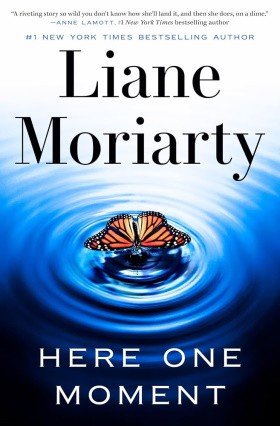Paula has always been excellent with faces and sometimes suspects she might be a “super-recognizer,” one of the two percent of the population with such superior facial recognition skills that they get employed by the military. However, it’s also likely she overestimates her abilities simply because she’s just so good in comparison to her sister, who is notoriously bad with faces and once stood behind Paula in a supermarket line looking blankly at her for a good few seconds before Paula said, “Lisa, you idiot, it’s me.”
Paula is clearly not a super-recognizer because if she really has seen this woman before, she can’t remember where. There goes her career with the military.
“I expect pneumonia.” The lady points at the Scottish man. “Age ninety-one.”
“Ah. Pneumonia. The old man’s friend.” The Scottish man nods with satisfaction as if that’s exactly what he’d anticipated. “Very likely. I’m sure you’re right.”
The lady points at Paula. “I expect—”
“I don’t want my fortune told,” interrupts Paula. “Thank you anyway.” She shifts the baby in her arms.
“I expect chronic obstructive pulmonary disease. Age eighty-four.”
“Really?” Paula’s not sure what chronic obstructive pulmonary disease means, but eighty-four does not seem particularly old to her. Her grandmother just turned eighty-eight and is in excellent health, still playing golf twice a week. She has far more energy than Paula.
“We actually have excellent longevity in our family.” She’s not sure if she’s trying to be witty for the benefit of the Scottish man or if she’s truly hoping to convince the lady to give her a different prediction. “So I would have thought I’d make ninety.”
It doesn’t matter because the lady is not interested. She points at Willow. “I expect—”
“No,” says Paula. “No, thank you. Definitely not. She’s too little. Please don’t.”
“Pneumonia. One hundred and three.”
“Oh, snap!” says the Scottish man. “Although you would have thought they’d have a cure for pneumonia by then, wouldn’t you?”
“One hundred and three,” repeats Paula. “Well, all right.” She looks at her daughter’s matted dark curls and imagines her as a wizened old lady. She’ll be so grumpy! The afflictions of old age won’t suit Willow. The kid becomes enraged when her nose is blocked.
The lady looks beyond them to the next row. She goes to step forward and then does a double take when she notices the baby in Paula’s arms.
She stops in her tracks. She points at the back of Timmy’s head and for a moment says nothing. Her breathing quickens.
“What?” asks Paula. Surely she is about to say that Timmy will also live until he’s over one hundred like his sister, but the lady says nothing. Does she look sad? Is that sadness?
“What?”
“I expect,” she says.
Paula feels a sharp spike of panic. “No, stop, I don’t want—”
“Drowning,” says the lady. “Age seven.”
Paula feels it like a blow to the solar plexus. “Don’t say that. That is absolutely not true.”
“Oh, of course it’s not true.” The Scottish man holds a protective arm in front of Timmy.
He says to Paula, “These people are charlatans. I’m so sorry. I should not have encouraged her.” He addresses the lady in a louder voice, his accent thicker than before. “That’s enough now, madam, move along, please. We have no interest in your so-called expectations.”
The lady does not move. She is staring at Timmy with the most dreadful look of naked pain.
Paula shifts the baby to her side in a futile move to hide him from that awful gaze. The sudden movement causes Willow’s head to slide off her mother’s arm. She is instantly awake and upright, rubbing her eyes with her knuckles. Timmy unpeels his cheek from Paula’s chest and his whole body tenses.
“You should not say that sort of thing!” Tears spring up in Paula’s eyes. She always cries when she’s angry, which is infuriating. It sends the wrong message.
“But you see, fate won’t be fought,” whispers the lady.
“Mummy?” says Willow shakily as Timmy begins to whimper, but Paula is not done with this lady, although the lady is apparently done with her and is stepping forward to the next row.
Paula turns in her seat and calls out, “That is a terrible thing to say to a mother!”
Chapter 11
It was a terrible thing to say to a mother.
When I put my hands to my cheeks, I can still feel the heat of my shame.
I brought my profession, the profession I love, into serious disrepute that day, and we already had an image problem.
Chapter 12
“Excuse me! Madam!” Allegra is gaining ground. The thud, thud, thud of her footsteps reverberates through her body.
There is something very wrong with her lower back. Or perhaps it’s the middle of her back. She is holding it stiffly because it feels like the slightest movement will result in pain.
She can see the mother rocking the screaming baby. Her toddler, in the aisle seat, a little girl with flushed pink cheeks, is writhing about, arching her back in that way kids do. The man next to the mother is scrabbling for something in the seat pocket.
Allegra knows exactly what’s about to happen a microsecond before it happens, but she has too much momentum to stop.
Chapter 13

























